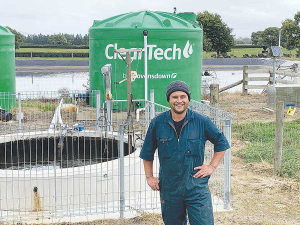Ravensdown partners with Footrot Flats to celebrate Kiwi farming heritage
Ravensdown has announced a collaboration with Kiwi icon, Footrot Flats in an effort to bring humour, heart, and connection to the forefront of the farming sector.
 Joel Riwhi, farm manager at the LIC Innovation Farm, Rukuhia, with the farm's ClearTech installation.
Joel Riwhi, farm manager at the LIC Innovation Farm, Rukuhia, with the farm's ClearTech installation.
Ravensdown's ClearTech dairy effluent treatment system reduces phosphate leaching by an “astounding” amount, according to recent research.
Lincoln University Professor Keith Cameron, who developed the system with colleague Professor Hong Di, says it reduces leaching by more than 90%, and up to 99.5% for some forms of phosphate.
ClearTech is designed to be installed between the dairy shed and effluent pond, intercepting and treating farm dairy effluent (FDE) with a coagulant to remove the solids.
The result is clear water which can be reused for yard washdown or irrigation, and a separate stream of more concentrated residue which goes to the effluent pond to be eventually spread on pasture in the usual manner. The system saves water, reduces the need for effluent storage and greatly reduces bacterial content in both the clear water and residue streams.
Earlier research had already shown that it changes phosphorus in the effluent into a less reactive form, and it has now been confirmed that it also reduces leaching because the coagulant binds to dissolved phosphate and only gradually releases it in the soil.
Cameron said that, of two recently-published research projects, one revealed the role of untreated FDE in producing phosphate leaching, while the second showed ClearTech’s ability to reduce it.
The first study, led by AgResearch’s Professor Richard McDowell, analysed 14 years of data from Lincoln University dairy farm lysimeters and concluded that significant P losses occur from certain soils even when FDE is applied according to regulations and following good practice guidelines.
It found phosphate losses of about 1.5kg/ha/year on areas where effluent was spread, versus just 0.25 for similar soils on non-effluent areas.
Cameron said they hadn’t realised how significant the effect was until they had analysed the data.
Then, a lysimeter trial conducted by Honours student Chris Chisholm in 2019 found that by using ClearTech-treated effluent, total phosphorous leaching losses were reduced by just over 90% and dissolved reactive phosphate (DRP) leaching by 99.5%.
“How excited could we be with that?” said Cameron.
“It’s astounding really when you think of it, that risk can be reduced by such a large amount.”
Phosphate leaching was not an original target of the ClearTech project. The research emphasised a benefit of ClearTech “that we had not really anticipated,” said Cameron.
LIC’s Innovation farm at Rukuhia, Waikato, has had a ClearTech installation running for about two years.
Farm manager Joel Riwhi says Cleartech’s big advantage is saving water, while being “really simple” to use.
“We’ve been saving roundabout 10,000 litres per day,” he says.
It gives him the luxury of a lot of clean washdown water without denting the farm’s bore allocation.
“We’re able to send the gates around to wash the yards more than twice to get everything off, nice and clean.”
Riwhi says they also use it to wash down the feed pad, instead the green water straight from the pond which they previously used.
The LIC Innovation Farm installation hosts one of Ravensdown’s two pilot plants, along with the Lincoln University Dairy Farm.
Cameron said LUDF saved a million litres of water in just the first seven weeks of the current season.
Carl Ahlfeld, Ravensdown’s ClearTech Product Manager, says the LIC plant gives annual fresh water savings of 4.3 million litres while reducing effluent volume by 67%.
That means about 89 fewer irrigation runs a year, with considerable flow-on savings in pumping and labour costs.
Additional reductions to costs for forest owners in the Emissions Trading Scheme Registry (ETS) have been announced by the Government.
Animal welfare is of paramount importance to New Zealand's dairy industry, with consumers increasingly interested in how food is produced, not just the quality of the final product.
Agriculture and Forestry Minister Todd McClay is encouraging farmers and growers to stay up to date with weather warnings and seek support should they need it.
The closure of SH2 Waioweka Gorge could result in significant delays and additional costs for freight customers around the Upper North Island, says Transporting New Zealand.
OPINION: The year has started positively for New Zealand dairy farmers and things are likely to get better.
Ministry for Primary Industries (MPI) Director General Ray Smith believes there is potential for an increase in dairy farming in New Zealand.